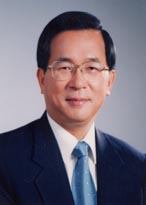 President Chen Shui-bian "I am absolutely against corporal punishment of children, or of women. Unfortunately, we see more and more cases regarding corporal punishment in families, schools and many corners of the society," |
TAIWAN - President Chen Shui-bian again expressed the hope that capital punishment will be "phased out" in Taiwan once and for all.
Chen made the remarks when receiving Siobhan Ni Chulachain, Vice Chairwoman of the International Human Rights Federation (FIDH), at the Presidential Office yesterday.
Chen said that Taiwan has made an effort to reduce the death penalty for years, and the number of people executed has been reduced from 32 in 1998, to 20 in 1999 and only 3 last year.
Chen first pledged to end the death penalty after he was elected in 2000, but he did not supply figures for the first three years of his presidency.
"So far, there's been only one execution this year. Our goal is to not have any executions in the near future," Chen said.
The president expressed his admiration for the International League for Human Rights, saying that because of the league's efforts, at least one country a year has repealed the death penalty recently.
Representatives of FIDH said that Taiwan's promotion of human rights serves as a good example for China and the rest of the world.
Later in the day, Chen received representatives of organizations advocating children's rights, including the International Save the Children Alliance and Taiwan-based Humanistic Education Foundation, Chen, saying that cases involving child abuse have been reported more frequently than ever, and called for banning corporal punishment of children in Taiwan's Educational Basic Law in a bid to change society.
"I am absolutely against corporal punishment of children, or of women. Unfortunately, we see more and more cases regarding corporal punishment in families, schools and many corners of the society," he said.
I would like to have the Ministry of Education include a ban on such punishments in Taiwan's Educational Basic Law," Chen said.
Chen said that Taiwan is becoming a country with no corporal punishment of children, as a showcase of education in Asia. Representatives said that not all adults realize that corporal punishment invades human rights of children and is a kind of child abuse.
"People don't know such punishment might create negative impacts on children both mentally and physically in the long term," said Dominique Pierre Plateau of the International Save the Children Alliance, which was founded in 1919 and offers assistance in 111 countries.
Representatives suggest that, in the era of human rights, Taiwan's government has to offer people new ways to review the necessity of corporal punishment, a method used for generations in the society to discipline children.
Representatives said that in Switzerland, the implementation of laws that clearly bans corporal punishment did not cause an increase in crime rates involving youngsters.